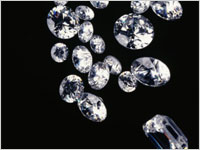Desperate American banks are selling everything that isn't nailed down (except the private jets).

President Bush neatly summed up the complex problems in the financial sector last week in terms he could understand. "Wall Street got drunk," he said. "It got drunk and now it's got a hangover." And to pay for the hangover cure, Wall Street is now selling Grandma's silverware and little Billy's new bicycle.
In recent weeks, American financial services companies have moved from the post-binge phase of dilutive capital raising—running around the world with a tin cup, urging well-heeled foreigners to invest in the crippled firms on purportedly advantageous terms—into the phase of selling the family jewels. Over the past year, banks have taken write-downs and raised new cash from investors, only to take new write-downs within weeks, thus turning those new investors into losers. And so as they face the need to raise more capital, banks can no longer raise billions from Dubai gazillioniaries and Chinese investment funds, who've been burned once. Now banks are having to sell their hard assets—in some cases, extremely valuable hard assets that have been passed down from generation to generation.
Take E*Trade, the online brokerage/lending operation, which has been reporting loss after loss despite raising $2.5 billion from the hedge fund Citadel. So last week, E*Trade said it would sell its Canadian subsidiary to Scotiabank for $442 million.
Merrill Lynch has been among the biggest losers in the credit debacle. Last December, reeling from losses and with its stock trading at about $60, Merrill raised $6.2 billion by selling securities to Temasek Holdings of Singapore and Davis Selected Advisers. A few weeks later, having suffered further losses, Merrill raised another $6.6 billion by selling preferred stock, mostly to the Korea Investment Corp., Kuwait Investment Authority, and Mizuho Corporate Bank. In the months since, Merrill reported a big loss for the 2008 first quarter, and its stock has lost about 40 percent of its value. (This is a one-year chart of Merrill.) Oops. And so last week, as Merrill reported a $4.6 billion second-quarter loss, it announced that it was raising billions of capital the old-fashioned way: by selling valuable assets. Merrill sold its 20 percent stake in the financial information titan Bloomberg back to Bloomberg for $4.425 billion. (Merrill had acquired the stake for pretty close to nothing back in 1985.) Merrill also announced it had "signed a non-binding letter of intent to sell a controlling interest in Financial Data Services, Inc. (FDS)," a unit that provides back-office services to money managers, for $3.5 billion.
Atlanta-based SunTrust has enjoyed a symbiotic relationship with local icon Coca-Cola for nearly a century. The bank midwifed the beverage company's initial public offering in 1919, and as this article notes, Coca-Cola's ultra-valuable secret formula was allegedly stored in a vault at the bank. As Coca-Cola grew—and as its stock split, time and again—SunTrust found itself with a massive stake in the company. But during the past year, as it has been hit by credit issues, SunTrust has been selling off its shares of the real thing. In June, it sold 10 million shares, raising more than $500 million. And this month it announced it would 1) donate 3.6 million shares of Coca-Cola to SunTrust's charitable foundation and 2) enter a transaction in which the remaining 30 million shares of Coca-Cola would be sold during the next several years. Combined, the sales will allow SunTrust to raise about $2 billion (at Coke's current price) to shore up its capital and bring to an end 90 years of profitable ownership. (Here are the company's second-quarter results.)
There's likely more heirloom-hocking to come. The Wall Street Journal reports this morning that several regional banks, which have already raised cash from outside investors to shore up shaky balance sheets, are now looking to sell mutual-fund businesses. National City, which in April raised $7 billion by selling shares to existing investors and the private equity firm Corsair Capital, is now looking to sell its Allegiant Funds unit. Fifth Third Bancorp, which last month raised $1 billion, has said it would raise another $1 billion through "the anticipated sales of certain non-core businesses." The Journal suspects one of those businesses might be the bank's Fifth Third Asset Management unit.
Selling heirloom assets is frequently a last-ditch alternative. In instances in which assets have appreciated massively (such as SunTrust's Coca-Cola stock or Merrill's stake in Bloomberg), the sales can generate hefty tax bills. Such moves are also recognitions that management has screwed things up so royally in the core business that it has no alternative but to sell the remaining assets that the market still likes. But in this climate, many banks may find they don't have a choice. The worst of the housing debacle may be behind us, but there's plenty more trouble to come in loans to builders and corporations, and in the vast consumer finance sector. And with outside investors leery of jumping in again, executives will be scouring the basement for stuff to sell. Corporate headquarters and conference centers, corporate art collections and fast-growing foreign units that can be severed with relative ease—pretty much everything that isn't nailed down. Except the fleets of private planes! If big-shot bankers can't have access to Gulf Streams, there's really no point in being a big-shot banker.



No comments:
Post a Comment